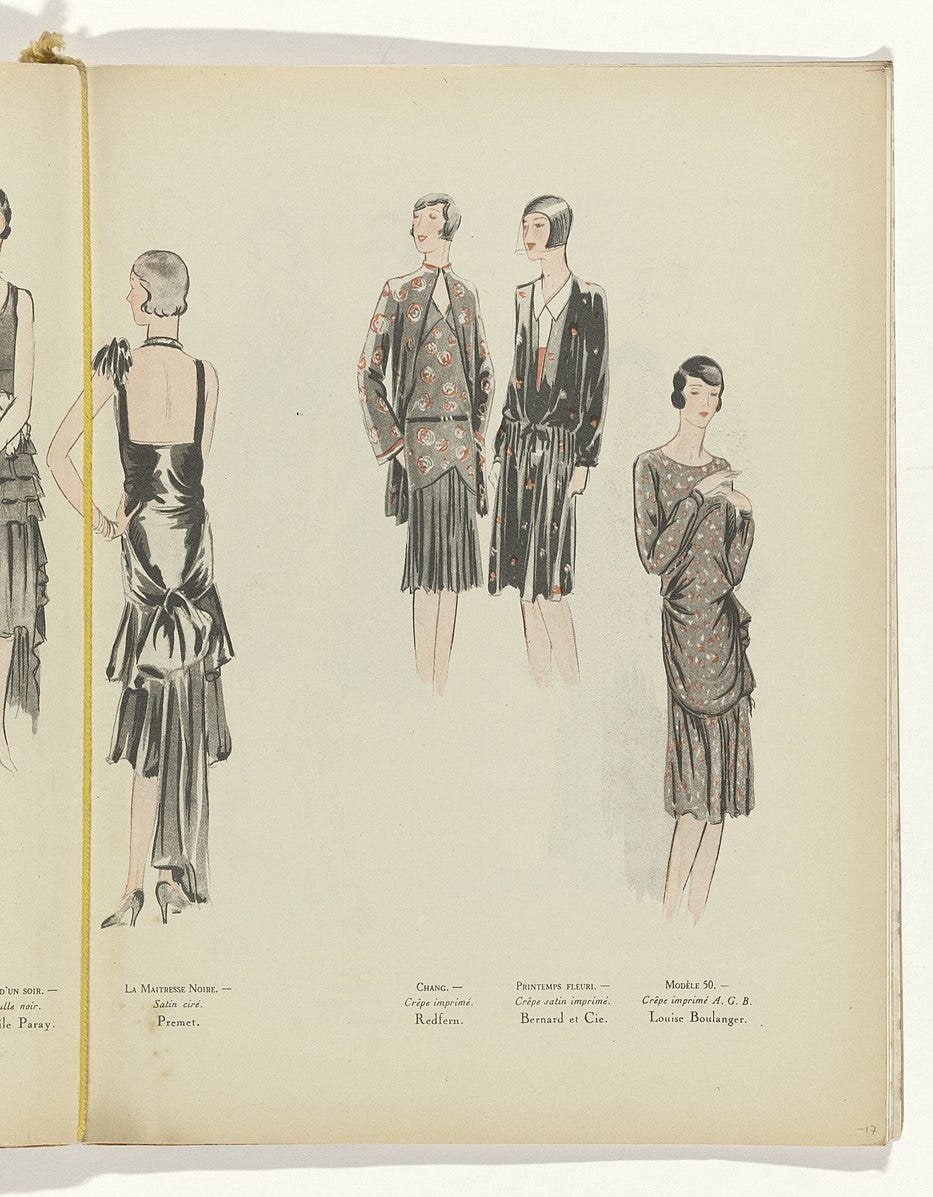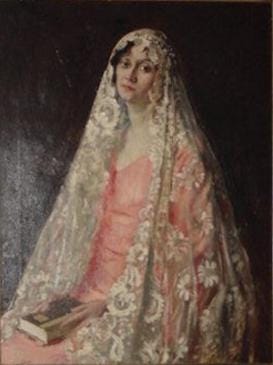Love--or not!--in the back seat...
Elizabeth Bibesco gives us a brief cinematic glimpse into a world that seems to exist whether we read it or not. Below is the entirety of one of two short stories about short, but intense, taxi rides.
From Elizabeth Bibesco, ‘Two Taxi Drives’
With a dedication to Paul Morand
Taxi Drive II: LAMPS
"I love you so." The wheels of the taxi were the counterpoint to his voice.
"What is the good of my turning away when every bit of him bites into my consciousness?" she thought.
The road stretched ahead of them like ciré satin with a piping of lights. She had changed her position a little, restless under the constraint of his eyes. A lamp lit her up for him, her face white and drawn, her eyelids pulled over her eyes like a heavy curtain.

"One feels that one could skate down the street," she murmured, "it looks like stuff worn thin with time and use—the shabby shiny surface of the night."
On and on they went.
"We can't get anywhere," he said.
A lamp lit up her face.
It looked so weary and impotent as if she had abdicated the uneven struggle with circumstances.
On they raced, down the slippery ribbon of road.
There was a bump and she fell towards him. He stretched out his arm and held her firm and secure. He wanted her to feel that it was a rampart and not an insidious outpost of passion quick to take advantage.
"Let me kiss you once, for God's sake," his voice was harsh.
She turned her face towards him. The passing lamp showed her resigned, pitying, tender.
"Don't look like that," he said—sharp with the things he had wanted.
"I'm sorry," her voice was velvety and comforting.
Yet another lamp, there was a faint smile on her lips—breathed as it were from him. He huddled into his corner, hurt by her compassion.
"I hate to see the moon," she said, "cynical and prying—an eavesdropper of a moon."
Again a light gave him a fleeting vision of her—photographed on to his soul.
Her deep dark eyes, heavy with distress, the corners of her mouth repudiating the misery of the moment. She put her hand on his arm.
"Don't," she said, "there is in life such an incoherent mass of interwoven strands. And perhaps something comes and tears them all to bits."
Her voice was chanting—as if she were singing him a lullaby—then it became light again.
"Wait till the next lamp," she said. "And you will see in my eyes the old laughter that you used to love."
They turned down a side street and there were no more lights.
Abruptly the taxi stopped.
She got out. Her pale gold coat was a continuation of the moon.
She turned her brooding eyes away from him.
"Thank you for taking me home," she said; her voice had broken. She looked back—a smile turned on to her lips.
He heard her latch key. The door opened and shut.
What we love about this story…
As readers, we are in media res—simply thrown into the backseat of the taxi with these travellers with no explanation of where they are going and why things seem so strained between them. Yet the story, despite its brevity, manages to resist being an “incoherent mass of interwoven strands”: it has a clear narrative that begins with love and ends with separation, even if we are left trying to figure out what happened.
This close-up description of the visual space between two people makes the whole experience feel like cinema. This was a period in which movies were becoming increasingly popular, and the descriptions of the lamps illuminating the faces for just a moment at the time is reminiscent of film unspooling.
About the Author…

The English writer Elizabeth Bibesco (1897-1945) was a well-known figure of her time, both in European high society and amongst artists and writers. She published her short stories in magazines such as The New Statesman and New Republic, and they received praise from now better-remembered modernists such as Rebecca West and Elizabeth Bowen. As the daughter of Prime Minister Herbert Asquith and a close friend of figures such as Marcel Proust and Jean Cocteau, she has often played a walk-on role in history rather than being appreciated in her own right.
To Read Alongside…
Last year we featured a longer short story by Bibesco for a cozy winter read. Find it below.
Suggest a LitHit!
Tell us your own favourites from literature you've read, and we can feature you as a Guest Curator if you like. Just email us with the following information:
Your full name
The title of the book you're suggesting
The location of the excerpt within the book (e.g., "in the middle of chapter 5"), or the excerpt itself copied into the email or attached to it (in Word)
Why you love it, in just a few sentences
About LitHits
LitHits helps you make time for reading by bringing you unabridged excerpts from brilliant literature that you can read on the go, anytime or any place. Our curators carefully select and frame each excerpt so that you can dive right in. We are more than a book recommendation site: we connect you with a powerful, enduring piece of literature, served directly to your mobile phone, tablet or computer.
Today's guest curator...
Dr Daniel Abdalla is a core member of LitHits and an expert in nineteenth and twentieth-century literature, particularly its relationship to science.
You might also enjoy...
Feedback
We'd love to hear your thoughts on our newsletter:
kshepherdb@yahoo.co.uk
Graphic design by Sara Azmy
All curation content © 2023 LitHits. All rights reserved.




